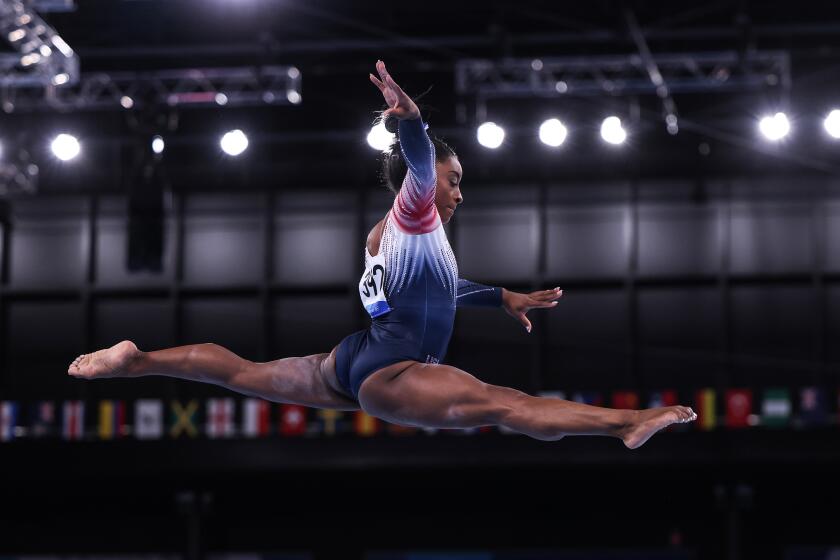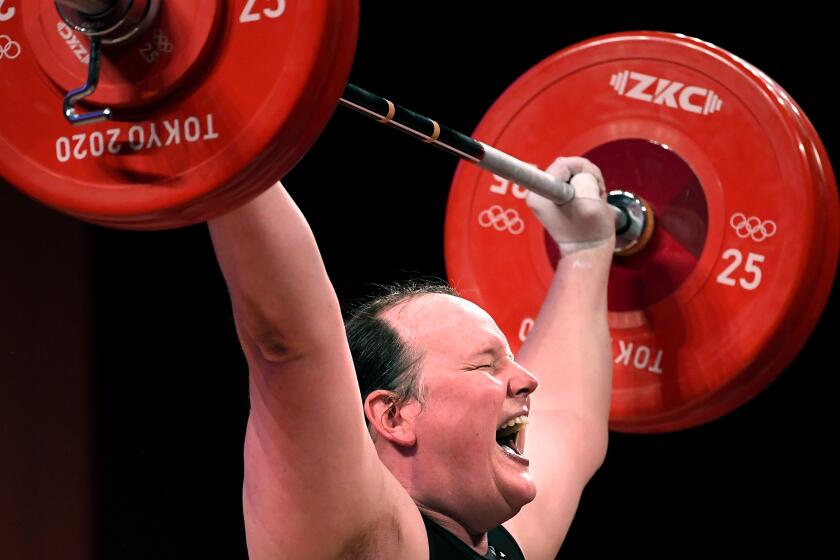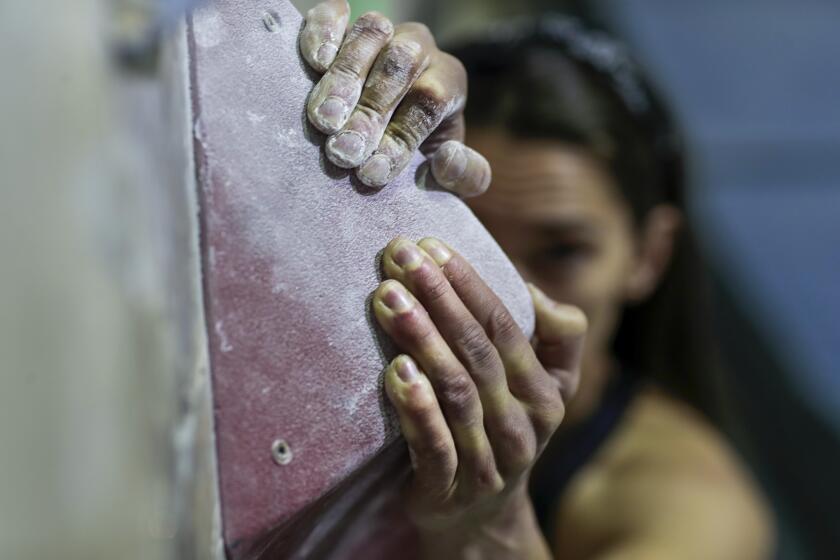After meteoric rise in skateboarding, Zion Wright rediscovers sport’s natural joys
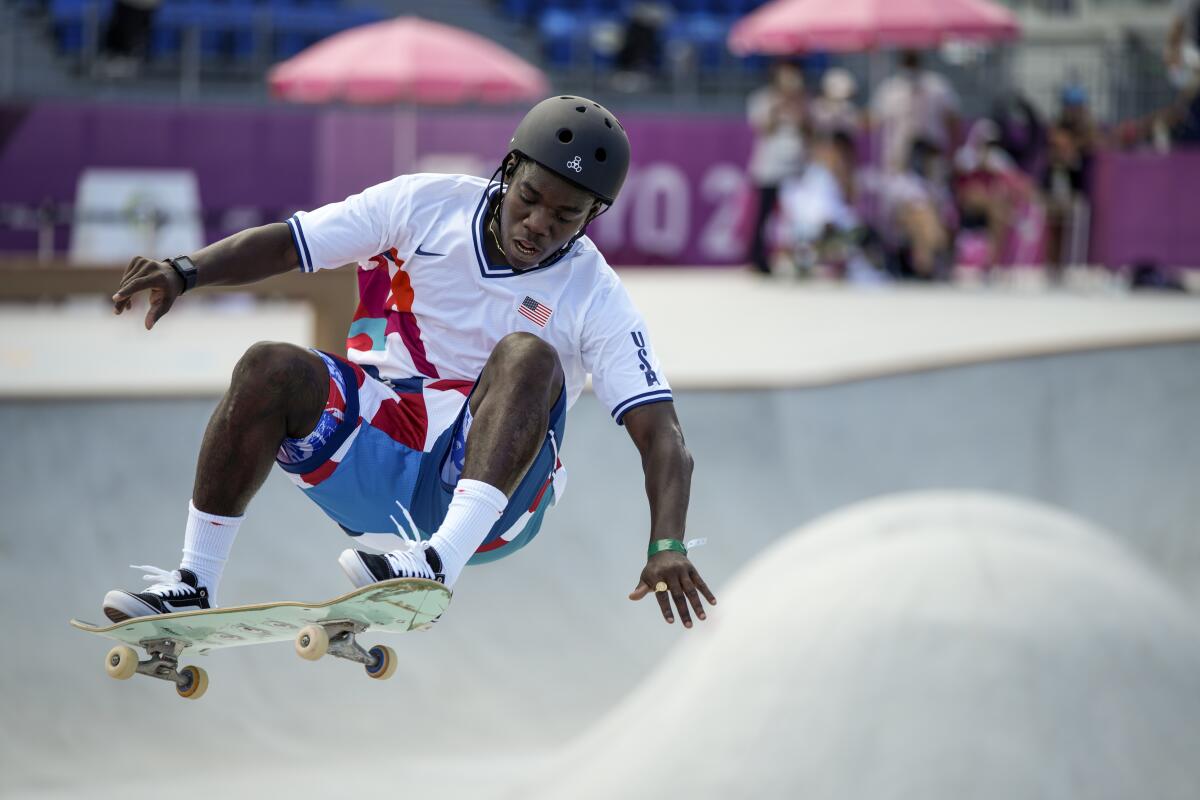
- Share via
TOKYO — A couple months before the Tokyo Olympics, Zion Wright was a long shot to make the U.S. skateboarding team. Knee surgery had slowed him down, buried him at 114th in the world rankings, and he needed to get back in shape for one more shot at qualifying. Still, he felt optimistic.
Getting up one morning at his place in Leucadia, the 22-year-old called his father — which he does on a regular basis — and took a shower. Then he began to weep.
“It was kind of crazy,” Wright said. “I could not stop crying. They were tears of joy.”
These Summer Games will be remembered for taking place during a global pandemic and, perhaps, for shedding light on the issue of mental health.
Simone Biles’ struggles in the gymnastics competition illuminated the immense pressure on many elite athletes. Pressure to compete, pressure to win. But don’t necessarily count skateboarders and surfers, another new Olympic addition, among this group. They bring a fresh perspective.
Simone Biles, who withdrew from most events on her Olympic schedule, made a remarkable return Tuesday, winning bronze in the balance beam final.
Wright is a perfect example. He was raised on equal doses of skating, ballet, jazz and Gullah Geechee culture. He is both thoughtful and lighthearted, given to tearing up with emotion and bursting into laughter in the confines of a single conversation.
A Cinderella performance in the last qualifying event got him to Tokyo. He arrived here for Thursday’s park-style contest with a cheery outlook.
“Just know I’ll be there with the biggest smile on my face,” he said. “Cheesing ear-to-ear, just enjoying life.”
———
Park style derives from skate parks found at community centers across the U.S. These shaped-concrete courses feature a mix of half-pipes and bowls, handrails and ramps. Navigating the terrain requires agility to grind and power to spin through the air.
Wright displayed all of this at Ariake Urban Sports Park on Thursday, ranking No. 1 after the first round of preliminary heats. But results were a small part of what he came looking for in Tokyo.
“Us skaters, we haven’t been training our whole lives to make the Olympics, that isn’t the goal,” he said. “We skate because it’s our culture, we skate because it brings us joy.”
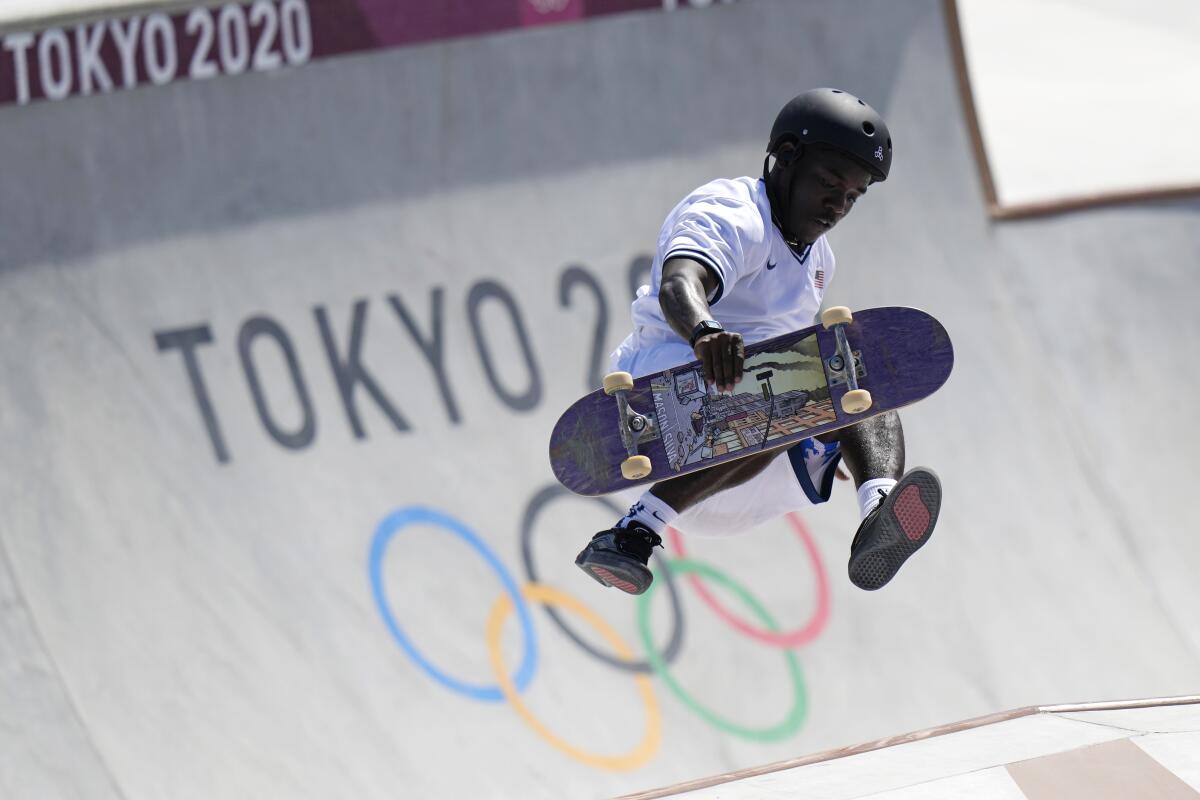
The sport was added to the Games, in part, to attract a younger audience. Neftalie Williams, a USC postdoctoral scholar and Yale visiting fellow who studies skating, believes it can democratize high-level competition.
“These pro skaters, they’re elite but they also hang out and skate on the weekend,” he said. “Skating is still in the streets, it’s there and accessible to everyone. We still want the sport to be fun.”
As the greatest skater in street contest history, Nyjah Huston might have felt more pressure than anyone at the Games. After a disappointing eighth-place finish in street, he spoke wistfully about going home and getting “back to real skateboarding life” with friends. Heimana Reynolds smiled after his early exit in park.
“I came out here to have fun,” he said. “We’re all here to skate and everyone killed it, so I’m just stoked.”
Surfers expressed a similar philosophy, with U.S. team member Kolohe Andino saying his sport means “more to me than competing or doing the Olympics. It’s a part of me.”
———
For Wright, it all started when his older brother got a skateboard for Christmas and he thought: That’s not fair. I want one too. The next year, at 4, he got one. His father had no idea what lay in store.
Mustafa Wright wanted his three boys and two girls to be well-rounded, exposing them to music and elements of the Gullah Geechee, descendants of Africans enslaved on the lower Atlantic coast who strive to maintain a distinctive culture. He recalls taking Wright to Bikram yoga and putting him in a skateboarding-inspired ballet.
Laurel Hubbard, New Zealand weightlifter, is among the first openly transgender athletes to compete at the Olympics.
Always, there were inspirational quotes.
Life doesn’t make you bitter, it makes you better. You throw stones at me, I take them and build with them. Your attitude determines your altitude.
Working various jobs as a plumber, cable television installer and newspaper deliverer, Mustafa did not realize his son was becoming serious about skating until the 8-year-old asked if they could drive three hours northwest from their home in Jupiter, Fla., to a contest in Tampa.
“I told him, sorry, I’ve got to work,” Mustafa recalled. “Then I laid there and cried like a baby.”
The next day, he quit his paper job and loaded his boys in the car. It was the start of a journey that would not always be easy. There weren’t a lot of Black skaters and Wright recalls a contest in Georgia in which someone left a note on the family car saying, “Go home. Don’t come back here.”
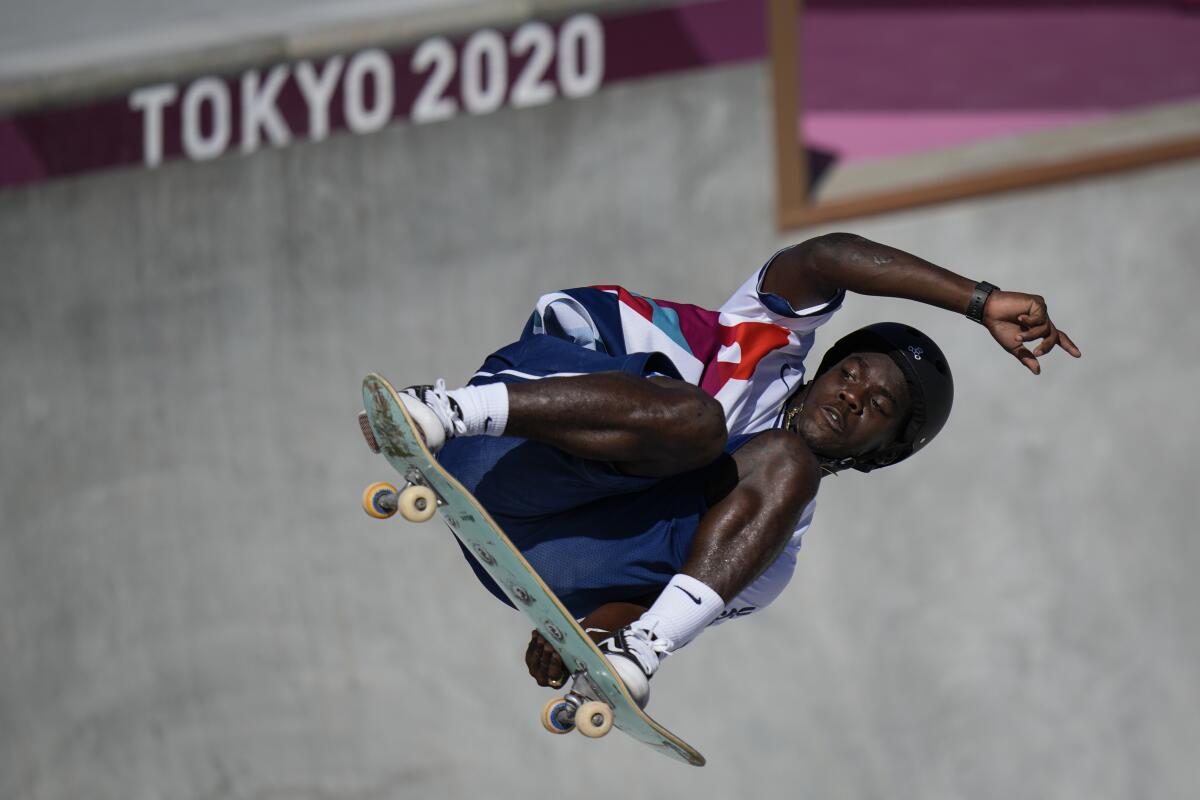
“To be honest, a lot of people didn’t think it was possible. I was like, why not buckle down and put my all into it and see what happens?”
— Zion Wright, on his rise in competitive skateboarding
“They weren’t used to seeing people like us go up there and put a whupping on,” he said. “It just made me want to go harder, shine more, smile more.”
At 16, Wright left home and moved in with friends in California, wanting to be around a higher level of skaters. Over the next few years, he accumulated top finishes in contests and became known for both his affable personality and the all-terrain skills that allowed him to excel in street and park events.
“I was in the mix where I needed to be, connecting with people in the skate world,” he says. “From there, stuff started happening.”
Nike and Red Bull eventually signed him to endorsement deals. There were skate videos and a couple of appearances on the HBO series “Ballers.”
But as the Summer Games added skateboarding and Tokyo drew near, Wright was hurting from the latest in a string of injuries and time was running out on the qualification process.
“To be honest, a lot of people didn’t think it was possible,” he said. “I was like, why not buckle down and put my all into it and see what happens?”
———
That long cry after the shower left him in a good mood, calm, sensing that maybe things were falling into place. His subsequent performance at a Dew Tour event in Iowa — his last chance — would confirm that intuition.
Sitting in an office chair at the Red Bull headquarters in Santa Monica a few weeks later, he spun and leaned and moved his arms in wave-like fashion, re-creating every moment of the final run in that park event.
“Boom! Backside 540. Fakie pop tart grab, come back grind, indie 360 over backside 540, frontside alley-oop into the front 5-0 grind,” he said. “Literally everything was linking together, boom-boom-boom.”
He stops for a moment to rub his arms.
“Look,” he said. “I’m getting goosebumps.”
His board shot 20 feet in the air at the end of the run as a television commentator exclaimed: “I’m going to say that’s it. That’s the gnarliest run we have seen.”
Just that quickly, Wright won the contest and vaulted into the third spot on the U.S. park team, joining world No. 1 Reynolds and Cory Juneau. Watching from home in Florida, Mustafa was once again amazed by what his son had achieved.
“I couldn’t believe he made the Olympics,” the father said. “But I told him, don’t even bring that in your head … keep having fun.”
———
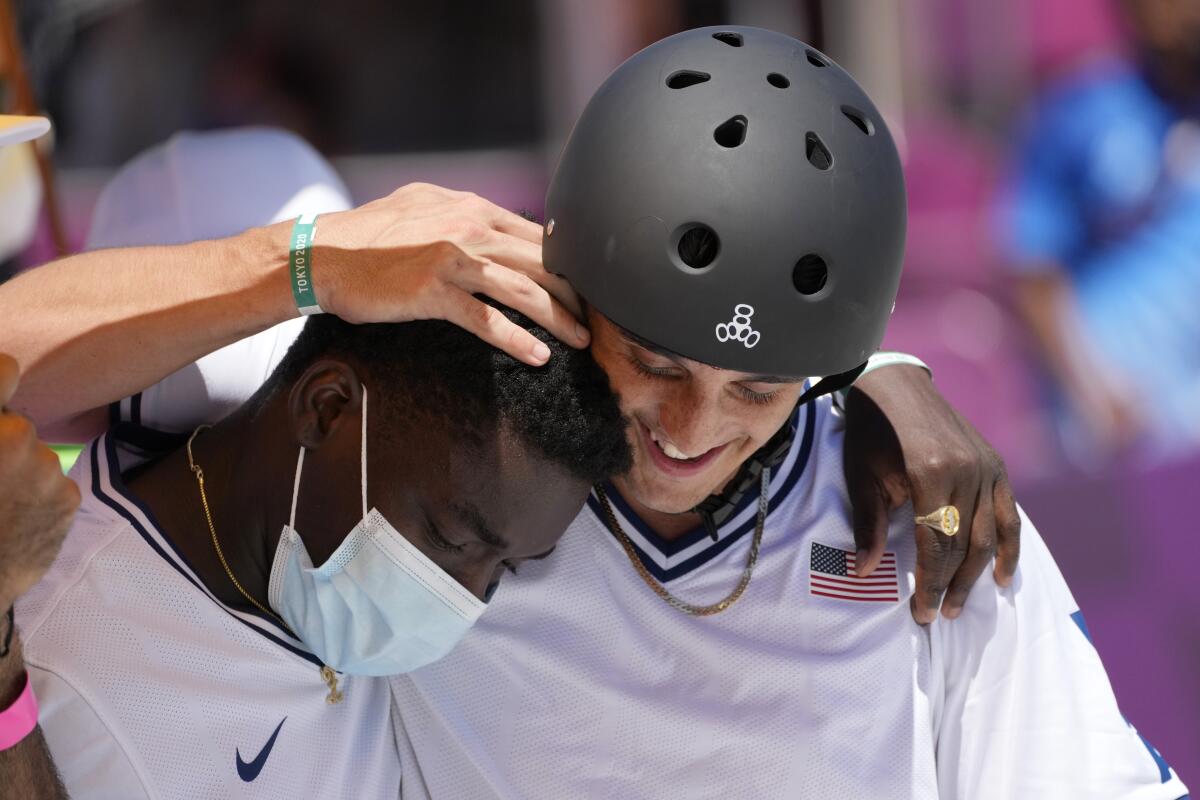
The Tokyo sun was already afire by early Thursday morning, the skaters sweating and looking for shade as the men’s park contest began.
Wright was among the first to go, sliding into the concrete bowl and hitting a series of tricks, spinning off the top of a hump, grinding along the edges of the course’s coping. His initial run was solid enough to keep him in the lead, with teammate Reynolds just behind, at the end of the first heat.
But the degree of difficulty would not prove sufficient, not with the Brazilians and Australians coming afterward, turning up the pressure in later heats. Neither American advanced to the midday final.
A few more difficult tricks during the heat would have been nice — “It’s not every day you have a perfect day” — but Wright was not downcast.
The hands make all the difference in Olympic sport climbing. Fingers must be strengthened and thickened over years, all the better to dangle from a ledge.
“Just because you’ve got someone from Brazil and someone from Italy, from Denmark, it doesn’t mean we don’t all stick together,” he said. “We all stick together, we also just want to see each other win.”
As if to prove the point, Wright stayed around the sweltering venue another two hours to cheer the skaters who made the final. He celebrated with Juneau, who took bronze, and popped out to hug gold medalist Keegan Palmer of Australia after a monstrous 95.83 final run.
So, at the end of the day, had Wright avoided the pressure of the Games? Was he still enjoying himself, still cheesing ear-to-ear under a COVID-required face mask?
“I’m here soaking it all in,” he said. “So, like, why shouldn’t I be smiling?”
More to Read
Go beyond the scoreboard
Get the latest on L.A.'s teams in the daily Sports Report newsletter.
You may occasionally receive promotional content from the Los Angeles Times.

